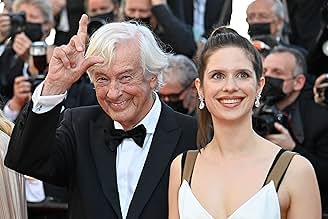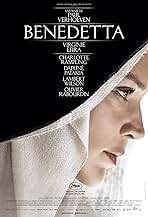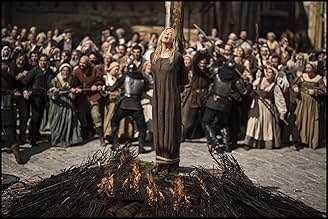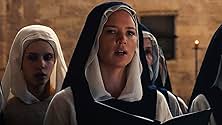Una monja del siglo XVII en Italia sufre perturbadoras visiones religiosas y eróticas. Ella es asistida por una compañera y la relación entre las dos mujeres se convierte en una historia de ... Leer todoUna monja del siglo XVII en Italia sufre perturbadoras visiones religiosas y eróticas. Ella es asistida por una compañera y la relación entre las dos mujeres se convierte en una historia de amor romántica.Una monja del siglo XVII en Italia sufre perturbadoras visiones religiosas y eróticas. Ella es asistida por una compañera y la relación entre las dos mujeres se convierte en una historia de amor romántica.
- Dirección
- Guionistas
- Elenco
- Premios
- 3 premios ganados y 21 nominaciones en total
Opiniones destacadas
Some film critics in Greece thought that this movie is a hybrid of parody and satire in its attitude towards organized religion. I disagree. Although the treatment of religious themes is rather blasphemous by pietistic standards the amount of human misery and suffering portrayed does not allow the viewer to conceive the movie as satire at least solely as such. Surely the religious visions and the sexual adventures of Benedetta treat religion irreverently but the consequences for her and her protégé Bartolomea have nothing humorous about them. In that time, unlike ours - at least in the West- no jokes were allowed concerning religion.
Misery, violence, intrigue abound in the plot and lust, although explicit, is just one of the sins portrayed. Ambition, struggle for power and precedence, avarice are the prevailing motives of the characters. Christian charity pales before those demonic passions although it is not totally absent.
The plight of the poor, the intrigues of the powerful, the omnipresence of the plague, the violence of the soldiery offer a bleak picture of society. One is reminded of Flesh and Blood by the same director situated in about the same historical period. Both have a central heroine with superb survival skills to help her navigate through insurmountable adversities.
Humour and satire exist but the general atmosphere is so ominous, so laden with menace, violence and disease that you are left saddened with the misery inherent in the human experience of 17nth century Tuscany. Nothing betrays the artistic splendour of the Renaissance, just a bleak struggle for survival and mastery, for power and precedence, for wealth and prestige where Christianity is used to serve those ulterior motives.
It is a sad movie. That said Virginie Efira and Daphne Patakia are gorgeous both artistically and sexually. But I think Charlotte Rampling in the role of the abbess gives the more memorable performance as a character full of ambiguity and contradictions. Lambert Wilson shines as the satanic nuncio although his character is rather flat in his evil propensities.
The costumes and the representation of the era are superb and the religious visions of Benedetta are far-fetched and subversive. Pietistic believers are going to be offended and will probably say: would he dare to do the same with Muslim religious symbols? But I do not think that the movie is anti-Christian. It shows how lofty ideals are used by flawed humans to further very earthly ambitions.
It is true though that without divine solace the society portrayed by Benedetta would be impossible to live in. Watch the movie and form your own opinion.
Misery, violence, intrigue abound in the plot and lust, although explicit, is just one of the sins portrayed. Ambition, struggle for power and precedence, avarice are the prevailing motives of the characters. Christian charity pales before those demonic passions although it is not totally absent.
The plight of the poor, the intrigues of the powerful, the omnipresence of the plague, the violence of the soldiery offer a bleak picture of society. One is reminded of Flesh and Blood by the same director situated in about the same historical period. Both have a central heroine with superb survival skills to help her navigate through insurmountable adversities.
Humour and satire exist but the general atmosphere is so ominous, so laden with menace, violence and disease that you are left saddened with the misery inherent in the human experience of 17nth century Tuscany. Nothing betrays the artistic splendour of the Renaissance, just a bleak struggle for survival and mastery, for power and precedence, for wealth and prestige where Christianity is used to serve those ulterior motives.
It is a sad movie. That said Virginie Efira and Daphne Patakia are gorgeous both artistically and sexually. But I think Charlotte Rampling in the role of the abbess gives the more memorable performance as a character full of ambiguity and contradictions. Lambert Wilson shines as the satanic nuncio although his character is rather flat in his evil propensities.
The costumes and the representation of the era are superb and the religious visions of Benedetta are far-fetched and subversive. Pietistic believers are going to be offended and will probably say: would he dare to do the same with Muslim religious symbols? But I do not think that the movie is anti-Christian. It shows how lofty ideals are used by flawed humans to further very earthly ambitions.
It is true though that without divine solace the society portrayed by Benedetta would be impossible to live in. Watch the movie and form your own opinion.
Sex and violence are par for the course for a Paul Verhoeven film, but, one rarely expects it in such copious amounts in a film based on a true story account of a 17th century Catholic nun, Benedetta Carlini. The key word is 'based' for Verhoeven and co-writer David Birke have freely adapted Judith Brown's non-fiction book.
Set in Tuscany, Benedetta is a tale of a young Italian woman (the movie is in French) who claimed to have had vivid visions of Jesus from an early age. Once in a Convent in Pescia, Benedetta (played as an adult by a stout Virginie Efira) rises to the rank of Abbess much to the dismay of the former Mother Superior, Felicita (an excellent Charlotte Rampling). Her manifestations continue and become more graphic even reaching the point of stigmata and speaking in tongues. A rumored affair with a fellow nun, Bartolomea (a mischievous Daphné Patakia) brings suspicion, scorn and charges of heresy in the form of Alfonso (Lambert Wilson; relishing his evil side) who comes from Florence to prosecute the case. The plague is raging and Verhoeven's film boils into a bloodier, sexier take on Ken Russell's THE DEVILS. Something of a MARK OF THE DEVIL for the Cannes crowd.
And yet, Verhoeven has created a work of subversive, yet profound, religiousness. Benedetta's devotion to the lord is never in doubt Her fervor, inspired and deeply felt even when not in keeping with the letter of scripture. Only a filmmaker as fervid as his subject could create at once something so sacrilegious while also remaining true to the essence of the character. There is no question that Verhoeven can never be accused of having good taste (and there are times here where if he pulled back even a little, it would have only improved the work), but, sometimes that seeming contradiction is what can create such stirring art. BENEDETTA is a direct challenge to believers and non-believers alike.
Set in Tuscany, Benedetta is a tale of a young Italian woman (the movie is in French) who claimed to have had vivid visions of Jesus from an early age. Once in a Convent in Pescia, Benedetta (played as an adult by a stout Virginie Efira) rises to the rank of Abbess much to the dismay of the former Mother Superior, Felicita (an excellent Charlotte Rampling). Her manifestations continue and become more graphic even reaching the point of stigmata and speaking in tongues. A rumored affair with a fellow nun, Bartolomea (a mischievous Daphné Patakia) brings suspicion, scorn and charges of heresy in the form of Alfonso (Lambert Wilson; relishing his evil side) who comes from Florence to prosecute the case. The plague is raging and Verhoeven's film boils into a bloodier, sexier take on Ken Russell's THE DEVILS. Something of a MARK OF THE DEVIL for the Cannes crowd.
And yet, Verhoeven has created a work of subversive, yet profound, religiousness. Benedetta's devotion to the lord is never in doubt Her fervor, inspired and deeply felt even when not in keeping with the letter of scripture. Only a filmmaker as fervid as his subject could create at once something so sacrilegious while also remaining true to the essence of the character. There is no question that Verhoeven can never be accused of having good taste (and there are times here where if he pulled back even a little, it would have only improved the work), but, sometimes that seeming contradiction is what can create such stirring art. BENEDETTA is a direct challenge to believers and non-believers alike.
Dutch grandmaster Paul Verhoeven has never made a secret of his very ambiguous attitude towards religion, often comparing it to a mass-delusion shared by the majority of the world. However, he has also admitted to his fascination with faith on numerous occassions, and in his movies, religious allegories are never far away: from Alex Murphy in RoboCop seemingly walking on water, to a catholic cross used to trap someone in a coffin in Blackbook.
Religious visions had already played a prominent part in Verhoeven's Dutch classic The Fourth Man and his American debut Flesh + Blood, but Benedetta is his first foray into organized religion as a setting for a full movie. Though based on a book about a real historic figure, Benedetta is far from a simple biopic. We learn enough of the life of the titular character, but Verhoeven is far more interested in exploring our human shortcomings, and one question in particular: to what extent can people really surrender to faith, and all the rules and regulations that come with their system of belief?
The cynic side of his vision is pretty clear in the beginning, when we learn that a religious order is just like any other business model, only accepting novices for financial compensation; their laws, standards and knowledge seem arbitrary and without any logical basis (usually in favor of men); and independent girls who display too much of a critical opinion about religious rules are quickly silenced. While sister Benedetta (Virginie Efira, who played the neighbor in Verhoeven's 'Elle') suddenly receives a series of visions of Jesus, it makes her believe that she was meant to lead, rather than just blindly follow her superiors. And the sudden arrival of the young and handsome novice Bartolomea strongly challenges her views and former teachings.
Both events serve as story catalysts that severely upset the order of things: Benedetta has always been thaught that lust, especially for another woman, is sinful, but when the free-spirited Bartolomea shows her the carnal pleasures, it is clear that such beliefs don't go very deep. Verhoeven almost revels in showing that some of the higher-ups in the church aren't very strict with there vows either, especially when these don't serve their self-interests. But when Benedetta's miracles and inexplicable acts elevate her standing at the expense of others, it becomes clear how easily some people can hold on to ruling dogmas and regulations as long as they believe that these serve the common good; but as soon as these threaten their own power, status and desires, all religious charity and love for the fellow man go out of the window, and sinful human shortcomings such as jealousy, pride and greed quickly take over.
Verhoeven introduces yet another one of his strong but flawed protagonists, by making Benedetta a woman who manages to rally other people to her cause, in spite of the anti-feminist sentiments of the era. He shows that even though the divine may be largely a physical and mental illusion, the power of religion isn't necessarily evil, and can be used for good. At the same time, his Benedetta is definitely no saint: he explicitly allows for the possibility that her miracles are partially manipulated. However, he cleverly doesn't answer the question whether she truly believes that God is using her body for his works, or that she is knowingly manipulating everyone from the start under the pretense of piety.
As expected, production design and cast are great. Virginie Efira can easily sell her naive character, but we still believe that there can be a calculated demeanor under that. Daphne Patakai is amazing in a very brave role as the whirlwind Bartolomea, and Lambert Wilson is just the right guy to play a pompous and self-serving church leader. Possibly the best work comes from Charlotte Rampling as the abbess, whose moral ambiguity seeps through best; she can believably switch between a money-hungry leader, ruthless opportunist and devout believer, even within scenes.
After his more subtle movie 'Elle', Verhoeven is back to his old trade: all the animalistic sides of human beings, like sex, violence, blood, feces, rape and torture, are amply represented. Some people seem to get hung up by the almost 1980s-grade amounts of nudity that they believe takes away from the feminist undertones, but the man himself has made it clear during the film's promotion that there is (and should be) nothing abnormal about sexuality and nudity in films about the human condition. Indeed, he doesn't hold back in that regard, with the creative use of a Maria statue as the film's most memorable moment. Verhoeven, always the provocateur, seems to openly challenge the contemporary negative attitude towards sex in movies, as if to say that we shouldn't be so squeemish about a bit of skin, or reduce a movie simply to the amount of naked women in it. And indeed, after some initial awkwardness in the audience, I felt that most viewers gradually went with it.
Despite all the Verhoeven ingredients being present, I don't feel that this is another one of his masterpieces, though. Where he normally has a brisk pacing and keen sense of dosing, the first half meanders a bit because there is a lot of set-up to be done. Another complication is that Benedetta's visions are depicted in an almost B-movie kind of way, which is almost unintentionally comical. The second half is where the slowly built-up conflict pays off, and although the movie doesn't have as many memorable scenes as some of his classics, one nasty torturing scene and a riveting climax surely make it an experience you will not soon forget.
This is an adequately made morality tale in the vein of The Name of the Rose, highly recommended for people who are interested in history and religion, and for fans of Paul Verhoeven.
Religious visions had already played a prominent part in Verhoeven's Dutch classic The Fourth Man and his American debut Flesh + Blood, but Benedetta is his first foray into organized religion as a setting for a full movie. Though based on a book about a real historic figure, Benedetta is far from a simple biopic. We learn enough of the life of the titular character, but Verhoeven is far more interested in exploring our human shortcomings, and one question in particular: to what extent can people really surrender to faith, and all the rules and regulations that come with their system of belief?
The cynic side of his vision is pretty clear in the beginning, when we learn that a religious order is just like any other business model, only accepting novices for financial compensation; their laws, standards and knowledge seem arbitrary and without any logical basis (usually in favor of men); and independent girls who display too much of a critical opinion about religious rules are quickly silenced. While sister Benedetta (Virginie Efira, who played the neighbor in Verhoeven's 'Elle') suddenly receives a series of visions of Jesus, it makes her believe that she was meant to lead, rather than just blindly follow her superiors. And the sudden arrival of the young and handsome novice Bartolomea strongly challenges her views and former teachings.
Both events serve as story catalysts that severely upset the order of things: Benedetta has always been thaught that lust, especially for another woman, is sinful, but when the free-spirited Bartolomea shows her the carnal pleasures, it is clear that such beliefs don't go very deep. Verhoeven almost revels in showing that some of the higher-ups in the church aren't very strict with there vows either, especially when these don't serve their self-interests. But when Benedetta's miracles and inexplicable acts elevate her standing at the expense of others, it becomes clear how easily some people can hold on to ruling dogmas and regulations as long as they believe that these serve the common good; but as soon as these threaten their own power, status and desires, all religious charity and love for the fellow man go out of the window, and sinful human shortcomings such as jealousy, pride and greed quickly take over.
Verhoeven introduces yet another one of his strong but flawed protagonists, by making Benedetta a woman who manages to rally other people to her cause, in spite of the anti-feminist sentiments of the era. He shows that even though the divine may be largely a physical and mental illusion, the power of religion isn't necessarily evil, and can be used for good. At the same time, his Benedetta is definitely no saint: he explicitly allows for the possibility that her miracles are partially manipulated. However, he cleverly doesn't answer the question whether she truly believes that God is using her body for his works, or that she is knowingly manipulating everyone from the start under the pretense of piety.
As expected, production design and cast are great. Virginie Efira can easily sell her naive character, but we still believe that there can be a calculated demeanor under that. Daphne Patakai is amazing in a very brave role as the whirlwind Bartolomea, and Lambert Wilson is just the right guy to play a pompous and self-serving church leader. Possibly the best work comes from Charlotte Rampling as the abbess, whose moral ambiguity seeps through best; she can believably switch between a money-hungry leader, ruthless opportunist and devout believer, even within scenes.
After his more subtle movie 'Elle', Verhoeven is back to his old trade: all the animalistic sides of human beings, like sex, violence, blood, feces, rape and torture, are amply represented. Some people seem to get hung up by the almost 1980s-grade amounts of nudity that they believe takes away from the feminist undertones, but the man himself has made it clear during the film's promotion that there is (and should be) nothing abnormal about sexuality and nudity in films about the human condition. Indeed, he doesn't hold back in that regard, with the creative use of a Maria statue as the film's most memorable moment. Verhoeven, always the provocateur, seems to openly challenge the contemporary negative attitude towards sex in movies, as if to say that we shouldn't be so squeemish about a bit of skin, or reduce a movie simply to the amount of naked women in it. And indeed, after some initial awkwardness in the audience, I felt that most viewers gradually went with it.
Despite all the Verhoeven ingredients being present, I don't feel that this is another one of his masterpieces, though. Where he normally has a brisk pacing and keen sense of dosing, the first half meanders a bit because there is a lot of set-up to be done. Another complication is that Benedetta's visions are depicted in an almost B-movie kind of way, which is almost unintentionally comical. The second half is where the slowly built-up conflict pays off, and although the movie doesn't have as many memorable scenes as some of his classics, one nasty torturing scene and a riveting climax surely make it an experience you will not soon forget.
This is an adequately made morality tale in the vein of The Name of the Rose, highly recommended for people who are interested in history and religion, and for fans of Paul Verhoeven.
Benedetta is a take on a real life story about a young woman in the middle ages who believes so wholeheartedly in Jezus and the love of God, that around her, mysterious stuff happens. What follows is a film that does not shy away from both controversy and visceral body action, while all the time, keeping the mystery alive, and occasionally even poking great fun at the subject.
Benedetta is put in the House of God with nuns and priests who do not really seem to believe in the divine themselves, setting up for conflict in religion and faith. This being a Verhoeven film, we get to see everything, including sex between nuns, which is not really a spoiler, since it made the film instantly infamous.
For a Verhoeven film, the sex and violence is actually mild, which isn't to say it's not prominent. But it's the underlying story that makes it truly interesting: how does a woman with such devotion, love and sex appeal, fair in the horridly abusive culture of the Church in the middle ages? Does she overcome it? And is she truly blessed by God or not?
I'll leave that for you to discover yourself. I will say without giving anything away, that the acting and directing is done with ferocious passion and conviction, that the film covers all emotions and feels accurate in its depiction of this historic woman her life.
Again, Verhoeven delivers.
Benedetta is put in the House of God with nuns and priests who do not really seem to believe in the divine themselves, setting up for conflict in religion and faith. This being a Verhoeven film, we get to see everything, including sex between nuns, which is not really a spoiler, since it made the film instantly infamous.
For a Verhoeven film, the sex and violence is actually mild, which isn't to say it's not prominent. But it's the underlying story that makes it truly interesting: how does a woman with such devotion, love and sex appeal, fair in the horridly abusive culture of the Church in the middle ages? Does she overcome it? And is she truly blessed by God or not?
I'll leave that for you to discover yourself. I will say without giving anything away, that the acting and directing is done with ferocious passion and conviction, that the film covers all emotions and feels accurate in its depiction of this historic woman her life.
Again, Verhoeven delivers.
It's hard to tell if this movie is trying to be realistic while implying some messages on religious hypocrisy, delusion and desires, or if it's just trying to be a fantasy, or even satirical. But it's definitely compelling, exciting and entertaining. It's provocative, crazy and might be annoying to some. Lead performance is solid.
¿Sabías que…?
- TriviaProduction ended November 2018, and the film was initially scheduled for release at the Cannes Film Festival in 2019, but in December 2018, director Paul Verhoeven had to undergo surgery for a hip injury suffered due to the set's location, which involved lots of hills and climbing. Post-production in Amsterdam had to be delayed until June 2019 to allow time for him to recover from his surgery. However, subsequent complications from pain medication caused an intestinal obstruction that ended in a life-threatening colon perforation; fortunately, Verhoeven's wife urged him to go to the hospital in time. Verhoeven and producer Saïd Ben Saïd agreed to delay the release to 2020 in order for Verhoeven to recover, and be fully present during the post-production process. Verhoeven still credits his editor Job ter Burg for finishing much of the film on his own while he himself was recovering and unable to attend. Eventually, the world-wide COVID-19 pandemic caused the movie to be delayed for another year.
- ErroresAfter the nuncio has demonstrated the pear of anguish, it is nearly closed again, but when he hands it to the torturer it is suddenly opened.
- Citas
Benedetta: Pride is a sin.
Soeur Jacopa: We're all entitled to a sin. What's yours?
- ConexionesFeatured in Javo & Temoc: Top 10 Películas: Lo "mejor" del año (2022)
Selecciones populares
Inicia sesión para calificar y agrega a la lista de videos para obtener recomendaciones personalizadas
- How long is Benedetta?Con tecnología de Alexa
Detalles
- Fecha de lanzamiento
- Países de origen
- Sitios oficiales
- Idiomas
- También se conoce como
- Blessed Virgin
- Locaciones de filmación
- abbaye cistercienne, Le Thoronet, Var, Francia(convent interiors)
- Productoras
- Ver más créditos de la compañía en IMDbPro
Taquilla
- Presupuesto
- USD 24,350,000 (estimado)
- Total en EE. UU. y Canadá
- USD 354,481
- Fin de semana de estreno en EE. UU. y Canadá
- USD 136,839
- 5 dic 2021
- Total a nivel mundial
- USD 4,265,353
- Tiempo de ejecución2 horas 11 minutos
- Color
- Mezcla de sonido
- Relación de aspecto
- 2.39 : 1
Contribuir a esta página
Sugiere una edición o agrega el contenido que falta

Principales brechas de datos
What is the streaming release date of Benedetta (2021) in India?
Responda
































